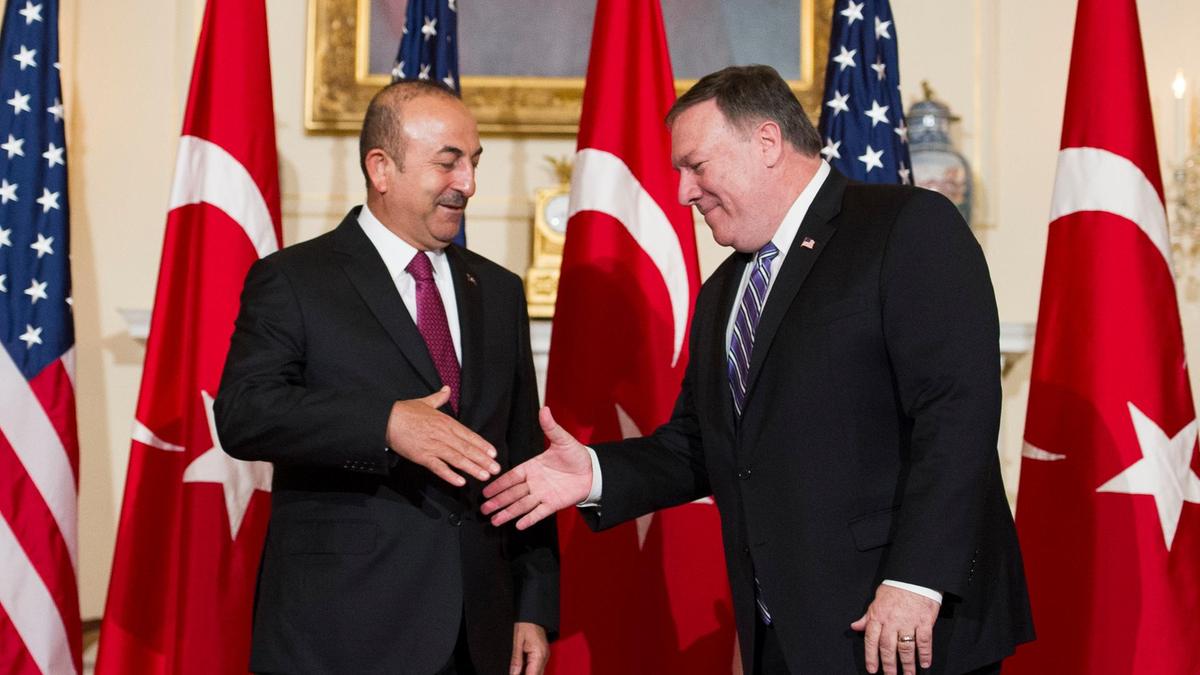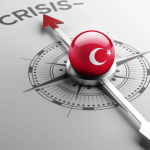When Turkey’s foreign minister Mevlüt Çavuşoğlu meets U.S. Secretary of State Mike Pompeo in Washington today, they will have plenty to talk about: Syria and the Middle East, Turkey’s plans to buy a Russian air-defense system, the murder of Jamal Khashoggi, and the European refugee crisis, among others.
But it is vitally important that Pompeo also raise a fundamental threat to the relationship between Washington, its allies and Ankara — Turkey’s sharp descent towards authoritarianism since the failed coup against President Recep Tayyip Erdoğan in July 2016.
Since then, over 150,000 public officials have been sacked for alleged coup links, with courts jailing over 64,000 others on terrorism charges. Over 150 journalists and media workers, as well as nine parliamentarians of the pro-Kurdish opposition party are behind bars.
Turkey has thus joined states such as Poland and Hungary in a broad-based assault on judicial independence, the media, civil society, rule of law and human rights.
The purge has targeted both alleged supporters of Fethullah Gülen, the exiled Islamic scholar blamed for fomenting the coup attempt, and independent civil society groups.
The centerpiece of this assault is the indictment on March 4 of 16 leading civil society activists on charges of “attempting to overthrow the government, or partially or wholly preventing its functions” during the Gezi Park protests that erupted in Istanbul over five years ago.
The 16 include Osman Kavala, a businessman and philanthropist who has been detained in Turkey since October 2017; Hakan Altinay, an academic who headed the European School of Politics in Istanbul; Gokce Tüylüogu, head of Open Society Foundations in Turkey; as well as a novelist, a playwright and other intellectuals and activists involved in education, social sciences, and the arts.
The Gezi Park protests began on May 28, 2013, after the police violently broke up a sit-in by activists protesting the redevelopment of Gezi Park at Taksim, one of the last green areas in central Istanbul.
Gezi quickly became the focus of public anger over a range of social and political grievances, with more demonstrations breaking out across the country.
The government’s heavy-handed response contributed to more than 20 deaths and thousands of injuries, and was widely criticized by the EU, the UN and the United States. Riot police eventually cleared Gezi Park on June 15.
The Turkish Constitutional Court recognized that the Gezi Park protests were entirely legal and protected by freedom of expression. Independent observers, including Amnesty International, described the protests as overwhelmingly peaceful.
In March, the European Union expressed its “strong concerns about the situation on rule of law and human rights in Turkey,” citing the indictment of the 16 civil society leaders. The United States has said it is gravely concerned by the indictments, and has urged the release of those “held arbitrarily.”
The 657-page indictment includes reams of transcripts of intercepted telephone calls, details of foreign trips, social media postings and surveillance photography of various meetings.
What it does not include is evidence of the government’s claims that Gezi Park was the result of a deliberate conspiracy to overthrow the Turkish government — a claim outlined before the indictment by President Erdoğan and other officials. Human Rights Watch said its analysis of the indictment found “an acute lack of specificity to the allegations it contains.” Moreover, “the prosecutor has made no serious attempt to discover a causal link between the alleged evidence… and the charges.”
This compounds concerns over the ongoing decay of the rule of law in Turkey. The Venice Commission of the Council of Europe and the International Commission of Jurists have condemned Turkey’s use of “overbroad and vague terrorism offenses” to silence activists and government critics. They have also called on Turkey to revoke recent constitutional changes that undermined the independence of the judiciary and represented “a dangerous step backwards in the constitutional democratic tradition of Turkey.”
There’s still time for Turkey to turn back from this path.
Amidst rising economic and political tensions — as seen in this weekend’s dramatic opposition successes in local elections in the country’s major cities — silencing civil society voices will not help deliver the long term stability and prosperity that President Erdoğan has pledged. Turkey has long been a reliable democratic ally in an unstable region. Its descent towards authoritarianism should be a primary concern for the United States.
BY SARAH H. CLEVELAND
Source: The Hill
Sarah H. Cleveland is the Louis Henkin Professor Human & Constitutional Rights at Columbia Law School, Member of the European Commission for Democracy Through Law (Venice Commission) and Commissioner of the International Commission of Jurists. Follow her on Twitter @Shcleve.



